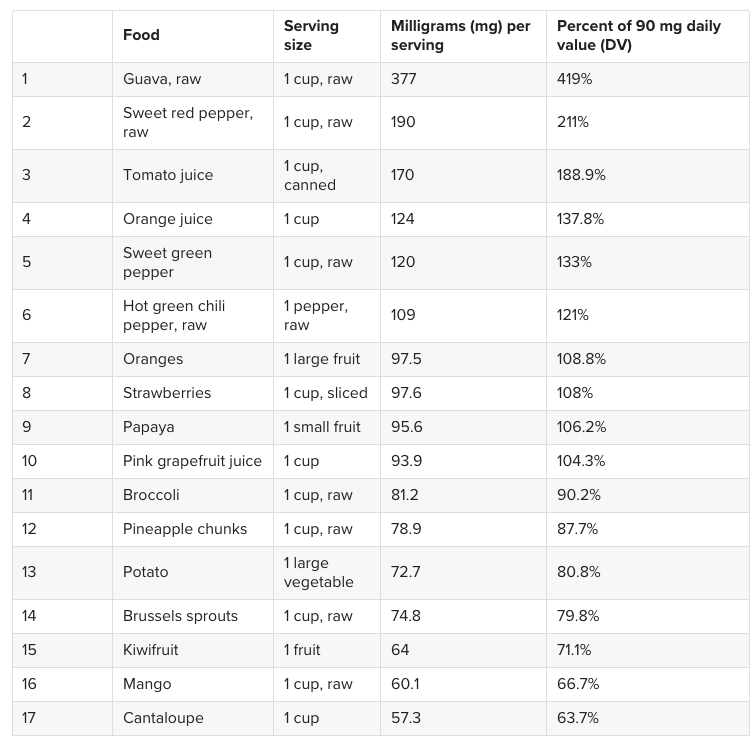Can Vitamin C Treat the Coronavirus?
Can Vitamin C Treat the Coronavirus?
No.
At this time, there is no evidence that Vitamin C can prevent or treat the Coronavirus.
In late March, I began to receive an uptick in questions about vitamin supplementation. There is little to no evidence that high doses of vitamin C will prevent or treat the Coronavirus. But some people have been recommending these supplements as a panacea for all viruses and all seasonal afflictions. There’s also been a few social media posts promoting vitamin supplementation as a cure for Coronavirus. In this blog post, I aim to set the record straight on vitamin C and Coronavirus.
What is Vitamin C?
First of all, Vitamin C (ascorbic acid) is an essential nutrient as it supports normal growth and development and it helps your body absorb iron. Your body doesn’t produce or store vitamin C, so it’s important to get enough vitamin C by eating a healthy diet.
Next, and according to the Mayo Clinic, the average adult needs 65 to 90 mg of vitamin C each day. Again, we can get enough vitamin C by eating a healthy, well-balanced diet. There’s 190 mg of vitamin C in a raw sweet red pepper and there’s 97.5 mg of vitamin C in a large orange. Other foods high in vitamin C include guava, tomato juice, orange juice, strawberries, papayas, and broccoli.
Here’s an awesome chart from Medical News Today that shows which foods are rich in Vitamin C.
The best way to get enough Vitamin C? A healthy diet. The above foods have adequate amounts of Vitamin C.
Where is this Bad Advice on Vitamin C coming from?
Here’s the issue, in late March I was forwarded general advice from a holistic doctor who went so far as to recommend as much vitamin C “as your body can handle” but at least 3,000 to 5,000 mg each day. In their words, this would protect you from the Coronavirus.
Not only is this person misleading their patients and giving potentially dangerous medical advice on a non-individualized basis, but he is also profiteering on their lack of knowledge. The doctor has an online supplement store where patients can purchase his recommended vitamins without a prescription for a hefty sum.
This email was forwarded to me from a holistic doctor who has been prescribing the above supplements as Coronavirus “protection.” As a family medicine doctor who follows evidence-based guidelines, it is very frustrating to see this type of bad information circulating via email and on social media channels.
Can Too Much Vitamin C be Dangerous?
When people think of vitamins, minerals, and supplements, they think of good health. If supplements are good, then more supplements are better, right? But what people don’t know, and what this vitamin-pushing doctor should know, is that mega doses of supplements can have negative consequences.
Most adults only need 65 to 90 mg of vitamin C each day, and adults shouldn’t take more than 2,000 mg each day. Although too much dietary vitamin C is unlikely to be harmful, mega doses of vitamin C supplements might cause diarrhea, nausea, vomiting, heartburn, abdominal cramps, headaches, and insomnia.
Let’s create a hypothetical patient who is a middle-aged adult man who takes Metformin 500 mg twice daily for his long-standing diabetes. The Metformin works well, keeping his blood sugar and hemoglobin a1c levels near normal. It’s important to know that adverse effects of Metformin include diarrhea, GI complaints, nausea, vomiting, and abdominal distention.
If both the Metformin and the high-dose Vitamin C are taken at the same time, the side effects from Vitamin C supplementation may be incorrectly attributed to the Metformin, potentially causing the patient to stop a beneficial medication.
Always Talk to Your Doctor about Your medications and your supplements
It’s entirely possible that in some cases, a patient might be taking mega doses of vitamin C, and not inform their physician of these supplements. Usually a doctor only asks their patients about which medications they’re taking, and not specifically about supplements. If the doctor doesn’t know about these mega doses of vitamins, those adverse effects caused by the vitamin C mega doses may be blamed on or attributed to a life-saving or life-prolonging medications prescribed by your doctor.
And this is just one example - many medications, from blood pressure medications to SSRIs for depression to other medications for diabetes like glipizide can have gastrointestinal side effects. So, please, talk with your family medicine doctor or internal medicine doctor about the medications and supplements that you’re taking.
What Can You do to help improve your immune system?
Here’s my recommendation for a healthy lifestyle during this time:
Exercise: 1 hour daily
Sleep: 7 - 9 hours daily
Eat: a balanced, healthy diet
Meditate: 30 minutes to 1 hour daily
If you choose to supplement with Vitamin C, talk with your doctor.
As a final note, the USA Today wrote a good article about this topic, and Harvard Health has another good article about this topic.
Thanks for reading, - Dr. Paul Thomas with Plum Health DPC



